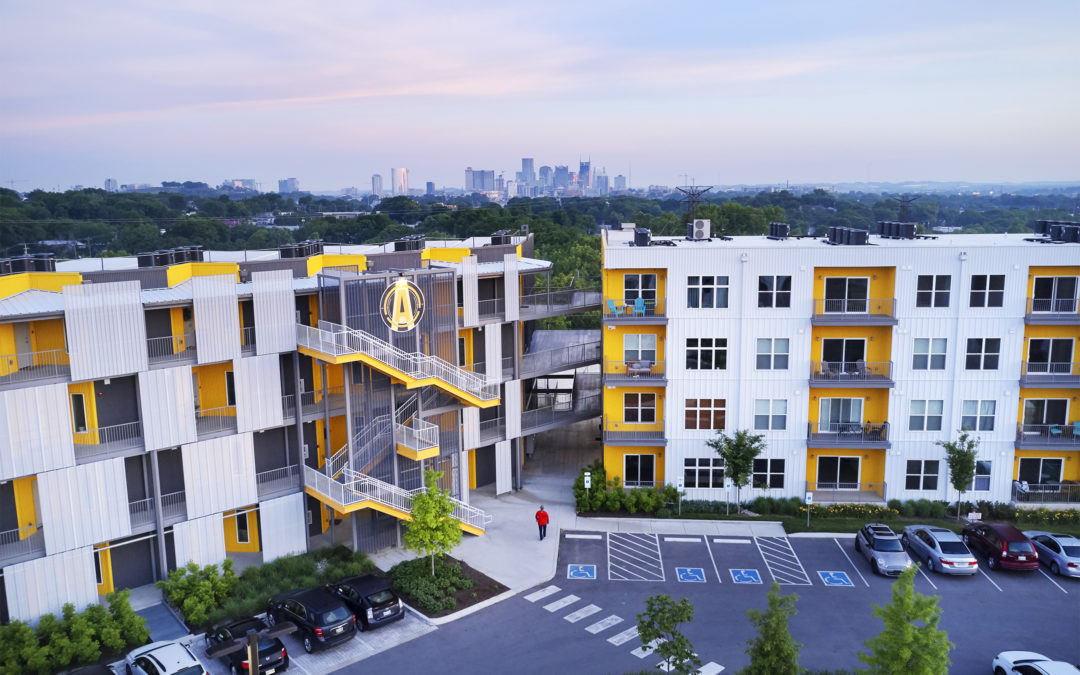As more cities struggle with the shortage of affordable and attainable housing, modular construction just might help bridge the gap.
Modular housing is not new. It dates back to the post-war boom in the United States and the United Kingdom when there was a need for quick reconstruction and social housing, but steel and labor were short. Since then, modular construction has fallen in and out of favor.
Japan, Scandinavia and other countries have implemented modular housing with success, but acceptance and implementation in the U.S. has been slower. With improved technology, and consumer and construction industry perceptions changing, more U.S. cities and developers are turning to modular construction to help with the attainable housing shortage.
A recent report by McKinsey & Company tracks the evolution and increasing impact of modular units in development. The report states, “In many countries, modular construction is still very much an outlier. But there are strong signs of what could be a genuine broad-scale disruption in the making.” The report also projects that modular construction could claim $130 billion of the market in the U.S. and Europe by 2030 and fill a $1.6 trillion productivity gap.
Nashville Case Study
In 2017, Core Development Services was faced with Nashville’s rising construction costs, a shortage of labor and a backlog at Metro Codes. We turned to modular construction as a creative solution for our Alloy on Tech Hill condominium project. It was the first modular-built condominium project for Nashville.
Sited on 5.5 acres just minutes from downtown Nashville, the Alloy neighborhood includes the Alloy 82 modular-constructed condominiums, Alloy 10/10 live/work and short-term rental units, and Alloy Artisan, an 8,000-square-foot building for mixed-use and artisan manufacturing.
Nashville-based EOA Architects designed the gray and yellow condominium complex, which includes one- and two-bedroom units and studio flats. The 82 units were built offsite in climate-controlled factories in Pennsylvania. Everything was pre-planned, pre-sized, pre-assembled, and modules began rolling down the assembly line in early May 2017. The 82 residential units and the clubroom extended across 100 modules. Each module required about nine days for assembly, with factories completing about four modules a day. By June 26, modules began arriving onsite in Nashville. Each unit was about 80 percent complete with glass shower doors, stainless steel appliances and wood cabinets, quartz countertops and hardwood floors. Completed units were wrapped and coded before leaving the factory, trucked to Nashville and assembled onsite on foundations. Like giant Legos, each unit was stacked by crane in appropriate order for the four-story complex. Stacking the 90,000-square-foot buildings took a mere three weeks. Plumbing and electrical were connected and siding, balconies and exterior stairs were added.
This modular approach provided a more predictable construction schedule, reduced construction time by one-third and lowered construction costs. Additionally, our construction approvals were quicker since inspectors sanctioned by the by State of Tennessee oversaw the assembly and approved everything before units were shipped.
The innovative process allowed us to bring a modern, affordable urban residential community to Nashville’s escalating housing market. Prices for the Alloy units started under $200,000 and topped out at $350,000, well below site-built projects in the area.
The American Institute of Architects Tennessee Chapter recognized EOA Architects and Alloy with a 2019 Excellence in Design Award. Judges said, “While Alloy’s outward expression is fun and playful, its employment of pre-fabricated modular construction speaks to a more technical side of design and the architect/fabricator/contractor collaboration.”
Modular Lessons Learned
As the first modular constructed condo project for Nashville, and the first for Core Development, we learned some things along the way. Fortunately, our Vice President Kent Campbell managed the project. Kent has managed modular commercial and student housing developments previously and drew upon that experience for Alloy.
He offers these tips when working with modular construction projects:
- Use a reputable general contractor experienced in modular construction.
- Select a manufacturer and contractor at the start and engage them when schematic design starts.
- Educate the local trades about the schedule and scope of on-site work involved.
- Maintain ongoing dialogue with local permitting/inspections officials.
Modular construction helped us develop and bring attainable housing to market quicker with less waste. With increasing land, labor and material costs, we encourage other developers to consider modular construction as a viable option for multifamily housing.

